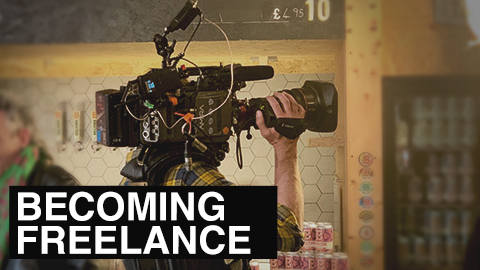Top tips to Becoming a Successful Freelance Videographer
Introduction
6 years ago, after a fun and prosperous career working within various different agencies and production companies, I decided to take the leap. I chose to leave a reliable and steady world of 9 to 5 for the topsy turvy world of freelancing. And after many ups, a few lows, a bunch of awards, a pandemic and all the other curveballs life tends to throw at you, I thought I’d take a minute out to share my learnings from my first few years as a freelance videographer.
What does it take to be a freelance videographer?
Being a freelance videographer isn’t all flat whites, tiny beanies and squinting whilst you make square shapes with your fingers… To be successful you have to be self-motivating, have great people skills and a knack for narrative. There are long days on set, long hours on motorways and long nights in the edit suite. I think key for me is to have knowledge and systems in place that come from experience. Understanding how long things will take and fully utilising diaries to keep organised and keep things blocked out, using WhatsApp groups to stay in contact with clients and colleagues and finding a place to work with a routine that means I’m reaching my maximum productivity.
I think to be a great freelance videographer, you need to be creative, you need to have passion and understanding for stories and you need to be organised. Whereas a producer, cameraman or editor may just be responsible for organising, shooting or post-production, a videographer has to be responsible for everything all at once. Sometimes this can stressful and hard work but when it all comes together, and you can bask in your glory, it’s all worth it!
A word of warning…
So what can be a hindrance to being a freelance videographer? The world of freelancing isn’t for everyone. There can definitely be less busy patches. There can be unknowns thrown at you. There is a lack of security and structure. But whilst some of us thrive on this, this isn’t for everyone. For a lot of people, the knowledge that knowing where the next paycheck will come from, knowing that all your tax and financial affairs are managed for you and having the security that a full-time contract gives you, is far more important the freedom of being your own boss. For me, I wouldn’t trade this for the world…

So after 6 years on the job, here are my:
15 Top-tips to becoming a freelance videographer
-
Focus on making great content
Make your focus about making great content. Make content you’re proud of and you want to shout about. Sure, service your clients and ensure they are happy with the content you’ve produced, but don’t worry about what other people are doing or what other people think of the work you’re creating. Great content sells in itself. If you make videos and films you’re passionate about that work for your clients, they’ll recommend you for other projects and you’ll build your business through recommendations. This is far more important than any other new business strategy you could develop.
-
Don’t worry about equipment
It’s so easy, particularly in the early days of setting up as a freelancer to focus on the tools you own. Some of the best filmmakers out there, will go out and create fantastic films on their phones. This doesn’t mean you can go out and shoot commercial content with your iPhone, but it does mean you should think about what you have and how you use it. Renting kit is very cost effective. If you include this cost in your shoot day rate and avoid buying all the big expensive camera bodies, you can save yourself a fortune. Investing in the stuff that will last a lifetime is always a good strategy, a decent tripod, good sound kit, a few nice lights, filters and monitors. Then renting camera bodies and lenses when you need them. Spending huge amounts of money on a piece of kit that for 95% of its life, will sit on your kit shelf collecting dust before being sold off on eBay for a fraction of the cost you paid for it, is not the best business strategy. Just because Philip Bloom has banged on about the latest autofocusing 8K Sony camera, doesn’t mean you need to own it to be a successful freelance videographer…
-
Know what you can do and don’t be afraid to use help
In the early days it’s very easy to just say yes to everything. With so many doors opening up, turning away work seems very counter intuitive. The problem is though, if you say yes to everything and then you struggle to deliver a video to the standard you promised, you will burn that bridge with that client. It’s important not to over promise and get help when you need it. For me, I know I can’t be onset, direct, shoot, light, record sound and do everything else that’s required to capture a decent video performance on my own. As a minimum, I like to work with a camera assistant that I trust fully in the knowledge that they’ve got my back and are keeping an eye on what’s going on. This means that the project rate goes up, but it means the client gets the video they’re expecting and I’m less stressed as a result. If a client hasn’t the budget for an assistant, I have to make a judgement call on whether I can deliver the video the client is expecting for that budget or whether the expectations need to be lowered from a fast paced run and gun gig with multiple speakers and a three point lighting setup, to a single sat down interview with basic lighting. Not all jobs call for beauty lighting so understanding what the client actually wants and requires is very important in those situations.
-
Development a business strategy
Before you take the leap to becoming freelance videographer, figure out how you’re going to make it work. New business won’t come to you but you may have better links than you think. When I took the leap to becoming freelance, I drew up a list of the contacts I knew that I could reach out to, to let them know I’m now freelance and available if they have any projects, they need a hand with. I then divided these up into hot, warm and cold contacts and estimated how many days work I think per month they might offer me. I worked out how many days I needed to work a month to make freelancing work and it quickly became a apparent that it was much more feasible than I thought. Websites out there like Production Base, Talent Manager and Mandy often list jobs as well as Facebook groups however these are very competitive so don’t rely just on these to secure new business.
-
Network with other great talent
If you’re going to ask for help, you need to make sure you’ve got people on speed dial who can help you. Film meetups, Facebook groups and WhatsApp groups are vital to meeting other top talent out there. Having a network of other great freelancers is so important to ensure you have people around you who can help support you. This can be challenging, there are a lot of great camera operators out there but for me, finding decent editors who you know you can ring up and they can help you deliver your mammoth editing project can be a challenge. I think it’s very easy to look at other freelancers as competition, but I think the reality is that there’s plenty of work out there to go around and if you treat everyone with the same respect you would give to any other colleague, we will ensure our clients get the best videos they can.
-
Get insured
As any new business should, you need to make sure you’re correctly insured. In the UK all videographers are required as a minimum to have Public Liability Insurance. This covers you if someone is injured or killed because of something you’ve done whilst in a business capacity. Many unions, such as BECTU offer this as part of their membership. As well as this, you will need insurance to cover hired in kit when you hire from a kit company, as well as insurance to cover your own equipment. As you become more established, you may also need other insurance types such as employer and indemnity.

-
Outsource whatever you can, but never lose that personal touch
Continuing the theme of working with other great talent, don’t be afraid of teaming up with other freelance videographers or editors to help you deliver a project. Just make sure your clients aren’t missing what drew them to work with you in the first place. If they love your relaxed attitude and witty banter, make sure they still get that and they don’t feel you’re palming them off to someone else.
-
Get a good accountant (from day one)
This is a very important point, and one any freelancer will stress. It’s incredibly important to be on top of your finances from the minute you start freelancing. Sole trader or Limited Company… VAT registered or not… How much to put aside for tax and national insurance… It’s important that someone who’s qualified and fully understands your financial situation advises you. At the end of year one, you will be required to pay all the tax from year one’s trading and you’ll need to ensure you have the correct amount of money set aside. In the first couple of years of trading, there are accountancy firms that specialise in simplistic accountancy models (Crunch for example) that can be helpful. If however, you’re truly passionate about building up your freelance videography business, look to get a proper accountant onboard who’ll give you personalised advice based on your situation. Basic accountancy models or umbrella companies aren’t always great setups to enable your business to grow quickly but can be more cost effective in the early days.
-
Automate everything you can
With so many different ongoing aspects to the business, for me I feel that automating what I can is really helpful to stay on top of things. I use the Xero financial platform which enables me to do quotes, send invoices and reconcile my bank accounts at the touch of a button. My accountant can also access this which speeds up end of year reports and VAT calculations. I use Dext (formerly Receipt Bank) to capture receipts (when they’re issued) which integrate with Xero so all my transactions can be quickly reconciled without too much additional input. Things like Dropbox, Adobe Creative Cloud and Google Docs are brilliant at syncing my documents across devices so wherever I am, I can access call sheets, treatment documents and assets.
-
Put time aside for admin
Setting time aside for admin is so important to ensure that you stay on top of your books. Half a day once a month to reconcile bank accounts, chase down invoices and do all the other bits of running a business is usually enough. It’s so easy when things get busy to forget to do this, but if you’re not careful, you can quite easily lose an entire evening to catching up on paperwork if a financial deadline is looming and you’ve forgotten to the accounts.
-
Acknowledge your mistakes, apologise and move on
From time to time, things will go wrong. Mistakes get made, briefs change, goal posts are moved… it’s very easy to blame someone else if not all goes to plan, but sometimes just holding your hands up and admitting you were wrong is the only thing you can do to salvage a client relationship, even if ultimately you don’t believe you were solely to blame. To a client, who may feel guilty themselves but won’t admit it, just hearing you say “I’m sorry, I could have handled this better…” will go a long way to mending a fractious relationship.
-
Pay the bills but find projects you enjoy
In the early days of setting up for yourself as a freelance videographer, you have all these notions about the fun and meaningful projects you’re going to do when you have time. But as the bills pile in and the to do lists get longer, working on projects that are meaningful easily fall by the wayside. However, I think it’s so important to make sure that every so often, you recalibrate your passion for video and work on something that’s meaningful to you. I know for a lot of filmmakers, that might be a short film, a drama piece or comedy sketch. For me it’s documentary and working on projects like Adventures Not Dams is enough to remind me why I do what I do.
-
Figure out how you work best
Within the agency and production company world, you’re encouraged to keep strict hours – 9 to 5, 10 to 6, etc… within the freelance world, within reason, you can do what you want, when you want. For me, I’m often quite productive in the evening, when the emails stop and you can crack on undisturbed. However, it’s important to remember that clients don’t necessarily work like that and delivering videos and being available when clients are, is just as important. Whilst I’ll often get a bulk of work done in the evening, I’ll try to ensure I’m available during normal office hours and if asked to deliver by EOP, I’ll aim for a clients end-of-play and not mine!
-
Don’t be scared of taking time out
Booking holiday in is always nerve wracking but making space for life outside of work is really important. Sure, it’s frustrating turning down big projects because you can’t make one shoot day due to family commitments, but work comes around and if you say yes to everything, you’ll never stop. For me holiday gets booked in the diary in the same way as a project would, and if I can’t do that job, then so be it… there will always be the next one.
-
Be professional
Always operate as professionally as you can. Keep a respect for the clients and colleagues you work with. Avoid burning bridges unnecessarily. Be available and approachable. Keep clients updated with delivery dates and details, if things change.

In conclusion
There’s no hard and fast way to becoming successful as a freelance videographer. For me I love the job and find it rewarding. It is hard work and not having the security of a permanent contract is daunting. However, I can’t imagine doing anything else now. For anyone else looking to take the leap, do your research, figure out if you can make it work, ask other professionals for their take, come up with a plan and do it!

